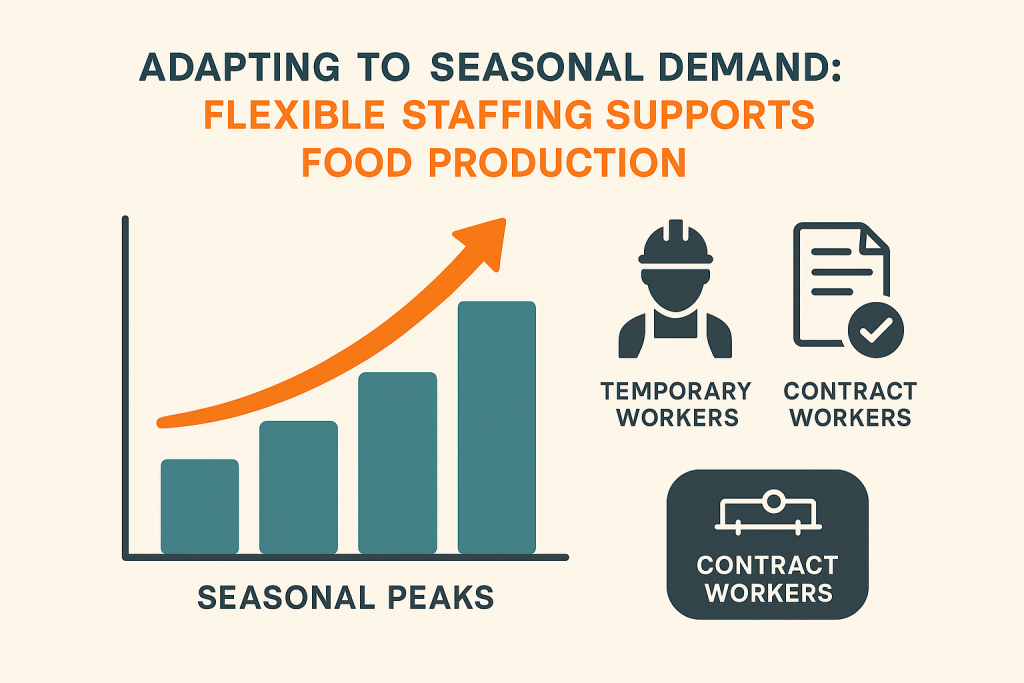The food production, processing, and manufacturing industry is the backbone of global supply chains, providing essential goods to millions of consumers every day. But unlike many sectors, it is heavily shaped by seasonal demand. Festive periods, harvest cycles, and consumer buying habits can lead to sharp spikes in production needs. This presents a challenge for employers: how can food producers ramp up output quickly without overstretching permanent staff or compromising on product quality?
The answer increasingly lies in flexible staffing solutions. By leveraging contract and temporary workers through recruitment agencies, food producers gain the agility they need to meet demand, maintain efficiency, and ensure consistent service.
Without the ability to flex staffing levels, companies risk damaging their reputation and losing ground to more agile competitors.
Understanding Seasonal Demand in Food Production
Seasonality is a defining feature of the food industry. Key demand peaks include:
- Festive periods such as Christmas, Easter, and New Year, when demand for packaged goods, baked products, and beverages surges.
- Harvest seasons, particularly for fresh produce, when processing and packaging lines must run at full capacity.
- Summer months, when beverages, frozen goods, and convenience foods often experience heightened demand.
- Special events or product launches can cause sudden spikes in orders.
According to FoodDrinkEurope, the EU’s food and drink sector is the largest manufacturing industry in Europe, employing over 4.5 million people and generating more than €1 trillion in turnover annually. Seasonal pressures directly influence staffing needs within this vast industry.
Challenges for Employers During Peak Periods
Food manufacturers face several hurdles when trying to adapt to seasonal demand, including:
- Overworked permanent staff: Overtime and long shifts can lead to fatigue, burnout, and reduced productivity.
- Recruitment bottlenecks: Hiring permanent staff for short-term roles is not cost-effective and can create HR inefficiencies.
- Maintaining quality standards: Increased workloads heighten the risk of errors in areas such as food safety, hygiene, and quality control.
- Supply chain disruptions: Any delay in workforce availability can lead to production slowdowns and missed deadlines.
Without the ability to flex staffing levels, companies risk damaging their reputation and losing ground to more agile competitors.

How Flexible Staffing Supports Food Producers
Flexible staffing, supported by recruitment agencies, provides a strategic solution for managing workforce fluctuations. By tapping into a pool of temporary and contract workers, food manufacturers can adjust their labour force based on immediate needs.
Key Benefits for Employers:
- Agility in Workforce Management
Employers can scale teams up or down with minimal disruption, ensuring they always have the right number of workers. - Cost-Efficiency
Hiring flexible staff allows businesses to meet peak demand without committing to the long-term costs of permanent employees. - Access to Skilled Workers
Many temporary staff bring industry-specific knowledge, enabling them to integrate quickly into production lines. - Reduced Downtime
Agencies supply staff who are often pre-screened and trained, meaning they can contribute effectively from day one. - Business Continuity
With additional workers available, production lines remain operational even if permanent staff are unavailable due to sickness or leave.
Advantages for Jobseekers
While flexible staffing benefits employers, it also creates opportunities for workers:
- Varied experience: Candidates gain exposure to different companies, technologies, and processes.
- Pathway to permanent roles: Many seasonal workers are offered long-term positions after demonstrating their skills.
- Work-life balance: Temporary contracts give job seekers the ability to choose assignments that suit their availability.
- Skill development: Experience in fast-paced food manufacturing environments strengthens employability across the wider sector.
For many candidates, seasonal roles serve as stepping stones to stable, rewarding careers within food production.
The Role of Recruitment Agencies
Recruitment agencies like PE Global play a vital role in bridging the gap between employers and candidates. By understanding industry cycles and workforce requirements, agencies can:
- Provide access to pre-vetted candidates with the right skills.
- Ensure compliance with industry regulations, including food safety and hygiene standards.
- Offer rapid staffing solutions to meet sudden spikes in demand.
- Support long-term workforce planning by identifying repeat seasonal workers who return year after year.
This partnership allows employers to focus on operations while ensuring staffing levels are consistently optimised.
Looking Ahead: Flexibility as a Competitive Advantage
With global supply chains becoming increasingly complex, flexibility is no longer a luxury; it’s a necessity. Food producers who adopt agile staffing strategies will be better placed to respond to seasonal demand, supply chain disruptions, and evolving consumer preferences.
By embracing flexible staffing, businesses not only meet immediate workforce needs but also strengthen their resilience and competitiveness in a fast-changing industry.
Conclusion
Adapting to seasonal demand in food production requires more than just extra effort from permanent staff; it requires a smart, scalable workforce strategy. Flexible staffing provides food producers with the ability to meet demand spikes, maintain quality, and ensure business continuity.
For job seekers, it offers valuable opportunities to gain experience and build careers in a thriving industry. Recruitment agencies act as the link that makes this possible, ensuring that the right people are in the right place at the right time.
As the industry continues to evolve, flexible staffing will remain a cornerstone of growth, stability, and success in food production.
